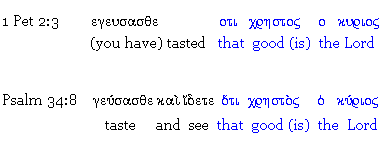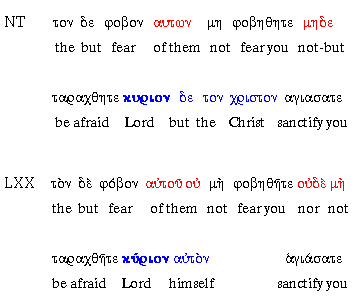1 Peter 2:3 and 1 Pet 3:14-15
 The Greek language Peter employed is clearly a reference to the wording of Psalm 34:8 in the LXX. The same verb for "taste" is used (though in a different form), and the phrasing and ordering of the words translated "that the Lord is good" is identical. For a 1st century Jew who knows his bible (in Greek, the LXX), the allusion would be familiar.
The Greek language Peter employed is clearly a reference to the wording of Psalm 34:8 in the LXX. The same verb for "taste" is used (though in a different form), and the phrasing and ordering of the words translated "that the Lord is good" is identical. For a 1st century Jew who knows his bible (in Greek, the LXX), the allusion would be familiar.
Now, who is being discussed in Psalm 34:8? The English Standard Version says,
"Oh, taste and see that the LORD is good! Blessed is the man who takes refuge in him!"
LORD, following the modern convention (whether you approve of it or not), refers to "YHWH" or "Yahweh" or "Jehovah." The New World Translation of the Old Testament also indicates that this is referring to "Jehovah." Peter quotes this Psalm which speaks of Yahweh's goodness and lovingkindness and mercy as a sure refuge and applies it to Jesus. If you have not "tasted" Jesus as the refuge for the sinner, the Savior, the sin-bearer for sinners, your only refuge, then you aren't a believer, and the rest of the context has no application to you.
1 Peter 3:14-15
Within these two verses, we find an almost direct quotation of words found in Isaiah 8:12-13 in the LXX. Let's look at the NWT's translation of 1 Pet 3:14-15 and Isaiah 8:12-13.
14 But even if YOU should suffer for the sake of righteousness, YOU are happy. However, the object of their fear do not YOU fear, neither become agitated. 15 But sanctify the Christ as Lord in YOUR hearts, always ready to make a defense before everyone that demands of YOU a reason for the hope in YOU, but doing so together with a mild temper and deep respect. (1 Pet 3:14-15, NWT)
12 “YOU men must not say, ‘A conspiracy!’ respecting all that of which this people keep saying, ‘A conspiracy!’ and the object of their fear YOU men must not fear, nor must YOU tremble at it. 13 Jehovah of armies—he is the One whom YOU should treat as holy, and he should be the object of YOUR fear, and he should be the One causing YOU to tremble.” (Isa 8:12-13, NWT)
You can kinda see the similarity, beginning with "the object of their fear...", but still, with the NWT you cannot see the true resemblance. However, when one looks at the Greek matchup between Peter's words found in the pertinent portion of verses 14-15 and the pertinent portion of the LXX's wording of Isaiah 8:12-13, we see:

Words that are different are found in red, with the exception of the key phrase here, which is found in blue. Even at first glance, you can clearly see that Peter is quoting the LXX version of the Isaiah text. As for the differing words in red, you can see that Peter adapted the language slightly. With those few exceptions, he uses the same vocabulary, verb forms, noun cases, etc.
The key phrase, highlighted in blue, is quite interesting. In the LXX it says "Lord himself." In the the corresponding original Old Testament in Hebrew, it says "Yahweh of hosts" or "Jehovah of hosts" or "Jehovah or armies," as the NWT says. Peter, obviously being familiar with this passage and to whom it referred, unabashedly altered that one phrase to apply it to Jesus: "but sanctify Christ the Lord." The very One, Jehovah, we are to sanctify in Isaiah 8, is identified with "Christ the Lord" by Peter! If Peter did not mean to make this connection, then it would seem strange considering how obviously familiar he was with the Old Testament and the LXX version of it -why would he miss the obvious connection? If Peter did mean to make that connection, would it not be absolutely blasphemous to replace Jehovah's very name, as referred to in that blue phrase, and put that of a mere creation?
A Jehovah's Witness may have a million things to say about why Peter "can't be" making that kind of identification, but forget about this verse for a moment. My question for the Witness is this: If I or someone else quoted an Old Testament passage with Jehovah as the subject and even naming the name "Jehovah," took out the name "Jehovah" and put "Christ the Lord," would you ever find that acceptable? Or even more pointedly, would you, a Jehovah's Witness, ever do that, yourself? You may say, "Yes, under a certain understanding," but let's say we never saw this verse. Wouldn't you consider it absolutely blasphemous to replace the Divine Name, Jehovah, with the title of Jesus, who is allegedly an exalted creature? Well, that is what Peter just did.
Considering the wealth of Watchtower material out there on the sanctity of the Divine Name, how it is to be set apart from everything else, and how zealously intent the New World Translation committee was in "restoring" the Divine Name to the New Testament, I find it extremely hard to believe that a Witness would, if answering honestly, find this practice anything but blasphemous, given their belief system. If the Witness would now turn around and equivocate, saying that it is acceptable if we only mean to say that Jesus is "like" Jehovah or some other kind of weak argument, then I would like to know how we can ever meaningfully identify idolatry -the giving of honor or worship to a creature which is due to God alone. If passages from the Holy Word of God, where Jehovah of hosts is Himself the subject, can be altered, the name "Jehovah" swapped out for the title of a creature so that the same Holy Scripture meant for Jehovah is now meant for this creature, and that is somehow not blasphemous or idolatrous, then how can we meaningfully identify blasphemy or idolatry at all? Again, my Witness friend, would you be comfortable doing what Peter just blatantly did? In your belief system, are"Christ the Lord" and "Jehovah of hosts" transferrable?
Conclusion
Now, stepping back, consider what this would mean to the first-century Jew. Would the first-century Jew find it at all appropriate to apply passages from the Holy Word of Yahweh God that speak of Yahweh God and His great attributes to anyone that is a created thing and not Yahweh Himself? No. This is one of the things that caused the Jews to become so irate with Jesus in passages such as John 10, even if you understand Jesus as rebuking them as misunderstanding Him. The fact that we see these two strong examples in the same epistle, along with the allusion to the "stone", and within the same frame of thought, is significant. These aren't isolated incidents.
I am aware of how the Witness comes up with so many things to say in response. "Jesus is the representative of Jehovah, that is how these passages can be applied to him." "Jesus is just very much like Jehovah." "The writers only mean to identify similarities." All assertions, for sure. Do these assertions make sense of the context? Why would we have any reason to think such things unless we already have a bias against what is being said? Are these truly answers or just cheap excuses? It is sad that people can have the exact same data, ostensibly, and come to two completely different conclucions. The determining factor? Presuppositions. Are Unitarianism and the idea that Jesus is a created thing fair, Biblical presuppositions, or are they just things you have taken for granted, assumed were scholarly, but never really considered could be wrong? I am asking you to think outside the box for a minute. What was Peter trying to convey? Why make these clear parallels if you are, like Peter and the rest, zealous for guarding God's sanctity and distinguishing the Jehovah from created things? Why are these parallels only made concerning Jesus?
A Side Note
One must also ask himself, given these passages and the fact that the New World Translation committee has been so adamant in "restoring" the Divine Name of "Jehovah" to the New Testament at total of 237 times (despite the fact that there is zero hard evidence supporting the idea that it ever was found in the New Testament in the first place), why the New World Translation committee was not consistent in "restoring" the name "Jehovah" here? It is very clearly referring to Jehovah in the original Hebrew passage. The NWT committe clearly identifies, in the appendix to the NWT Reference edition, that the basic criteria for restoring "Jehovah" is Old Testament quotation containing "Jehovah" in Old Testament original or allusion to Old Testament passages referring to Jehovah. They have placed "Jehovah" in places with much less Old Testament support than these, sometimes with no clear Old Testament support at all, so why not here? The bias found in the NWT is obvious. The NWT committee cannot follow their own standards consistently, in these cases, because it would contradict their theological position about Christ. To them, Jesus cannot be Jehovah because only the Father is Jehovah -the Unitarian bias cannot help but bleed through.

0 Comments:
Post a Comment
<< Home